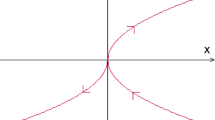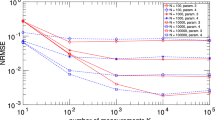Assume that a preparation apparatus does not work completely accurately and prepares systems with states ϕ1, ϕ2, ϕ3 …, say, with a priori probabilities p1, p2, p3 …, which depend on the construction of the apparatus. In this case, any 390 Mixing and Oscillations of Particles single system is actually in one of the states ϕi, which one, however, is not known to the observer who knows only the probabilities. This very special kind of a mixed stated is called a “mixture of states” [2], or “real mixture” [3] or a “Gemenge” [4]. A “Gemenge” ΓS (pk, ϕk) is a classicalmixture of states ϕk with weights pk.
Access this chapter
Tax calculation will be finalised at checkout
Purchases are for personal use only
Similar content being viewed by others
Literature
J. M. Jauch: Foundations of Quantum Mechanics (Addison-Wesley, Reading, MA, 1968, 96)
P. Mittelstaedt: The Interpretation of Quantum Mechanics and the Measurement Process (Cambridge University Press, Cambridge, 1998, 35–37)
B. d'Espagnat: Reality and the Physicist (Cambridge University Press, Cambridge, 1989, 85)
W. Heisenberg: Physikalische Prinzipien der Quantentheorie (S. Hirzel, Leipzig, 1930, 43)
Editor information
Editors and Affiliations
Rights and permissions
Copyright information
© 2009 Springer-Verlag Berlin Heidelberg
About this chapter
Cite this chapter
Mittelstaedt, P. (2009). Mixed State. In: Greenberger, D., Hentschel, K., Weinert, F. (eds) Compendium of Quantum Physics. Springer, Berlin, Heidelberg. https://doi.org/10.1007/978-3-540-70626-7_120
Download citation
DOI: https://doi.org/10.1007/978-3-540-70626-7_120
Published:
Publisher Name: Springer, Berlin, Heidelberg
Print ISBN: 978-3-540-70622-9
Online ISBN: 978-3-540-70626-7
eBook Packages: Physics and AstronomyPhysics and Astronomy (R0)




